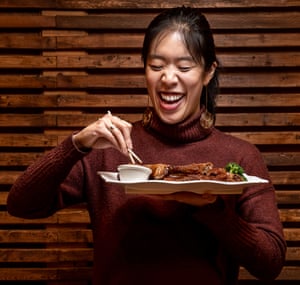| the-american-catholic.com |
Happy Holidays to one and all. Another exciting year on the blog is coming to a close and Yours Truly is excited about what 2020 will bring. The Blogger Candidate Forum is off until the new year when we will begin our look ahead to the 2020 General Election with posts on the candidates and issues, including impeachment. For now, Yours Truly would like to take a look at a sort of fine holiday tradition, why do Jewish people eat Chinese food on Christmas Day.
Jewish people eating Chinese food on Christmas Day is rather curious custom. There is nothing in any of Jewish religious text that says "Thou shall eat Chinese on Christmas Day." Yet, there is a long history of Jewish people eating Chinese food on Christmas Day. Rabbi Joshua Eli Plaut, PhD, the author of A Kosher Christmas: 'Tis the Season to be Jewish, the executive director of the American Friends of Rabin Medical Center, and the rabbi of the Metropolitan Synagogue in New York City, mused at the sign on the left,
I checked with other American Jewish historians,... We have found no evidence of this being authentic or not. It's urban folklore. But it doesn't matter because the is funny and it just goes to show you this is a real phenomenon. (forward.com; Dec. 25, 2019)
| Two Jewish men eating Chinese food vox.com |
Jewish people typically do takeout or go to a movie before sitting down for a hearty plate of spicy eggplant with tofu and noodles (Blogger's favorite). Rabbi Plaut told The Forward that the practice of eating out is known in Yiddish as oysessen and coined by The Forward in 1903 "to describe the trend of Jews coming down from their tenement coops to enjoy the fine cooking of their Chinese neighbors on Lower East Side" (Ibid). Interestingly, this trend goes further back to the end of the 19th century with the first wave of Eastern European immigrants.
Jennifer Lee, the author of The Fortune Cookie Chronicles: Adventures in the World of Chinese Food, the producer of of the documentary The Search for General Tso, and co-founder and president of the literary studio Plympton, said,
The Jews and and Chinese were the two largest non-Christian immigrant communities in American,... They didn't keep a Christian calendar so their restaurants were open on Christmas (Ibid).
 |
| Happy Chanukah and pass the sweet and sour chicken salon.com |
According to Rabbi Plaut, the first known example of what is euphemistically known as Jewish Christmas (Ibid) in the general calendar was in a 1935 New York Times article that profiled a restaurant owner named Eng Shee Chuck who gifted the Jewish Children's Home in Newark, New Jersey with lo mein. Something Rabbi Plaut calls a Christmas mitzvah [good deed; Ibid]. Chinese food--take out or sit down restaurant--is a staple of many American Jewish homes.
Part of the appeal of Chinese restaurants was, unlike Italian restaurants of the early 20th century, was the lack of Christian iconography. Another reason was that many Jewish people believe (or wanted to believe) that egg rolls and the like were kosher. Rabbi Plaut explains,
:no_upscale()/cdn.vox-cdn.com/uploads/chorus_asset/file/13644078/51regy_EccL._SX331_BO1_204_203_200_.jpg) |
| vox.com |
There are no Christian symbols on the walls,... There's no mixing of meat and dairy, and the pork that is evident is hidden. Hence the phrase 'safe treyf [non-kosher food]. You can't see it when you it eat it so it's ok. And the steamed pot sticker looks to be the equivalent of kreplach [dumplings filled with meat or vegetables; Ibid].
Jennifer Lee added,
Chinese people didn't look down on Jews as being less American in terms of Westernness because Jews were a lot closer to being perceived that way than they were,... It was also very exotic and cosmopolitan and a way to impress girls when you go on dates. And it tastes good! (Ibid)
Yes it does.
That was then and the practice of eating out is still going strong but the old school Chinese restaurants are disappearing in places like the San Gabriel Valley in Southern California. The reasons are numerous, among them: labor costs, financial challenges, and changing consumer tastes (latimes.com; May 15, 2019; date accessed Dec. 25, 2019).
 |
| Exterior of Ocean Star Restaurant Monterey Park, California usarestaurants.info |
One victim of the spat of closures is Ocean Star Restaurant in Monterey Park, California. The restaurant opened its 900-seat capacity in 1982 and gained fame as the premier dim sum palace in the city. This past May, Ocean Star abruptly shut its doors. Sunny Wan, the president of Ossa Miramar Inc. explained the closure in an email,
...the management team found it became more and more difficult to manage such a large-scale restaurant (Ibid).
Ocean Star typically had a healthy weekend crowd for its dim sum brunches but its weekdays traffic has noticeably dropped off. Ms. Wan said,
Traditional Chinese banquet spaces aren't as sought after as they used to be (Ibid).
 |
| Sample menu items from Little Sheep Mongolian Hot Pot Pasadena, Californa tripadvisor.com |
... rely on employees agreeing to work on 'salary,' but it usually means they do six days a week and usually double shifts every day except maybe one half day week,... Nobody wants to work like that anymore, especially younger cooks (Ibid)
It is also a matter of changing tastes. Cantonese cuisine has, until recently, been the most popular type of Chinese cooking style in the United States. Today, the greater representation of Chinese immigrants allows for a greater variety of regional representation. Another factor is generational changes.
 |
| Server at a Chinese restaurant theguardian.com |
Sunny Wan spoke with the Los Angeles Times about the generational forces at plays. Many younger Chinese Americans do not want to have traditional wedding banquets. He said,
That used to be the format for all the wedding in the SGV. Nowadays it's different. (Ibid)
David Chan experienced the generational shift first hand. He said,
We basically forced my son to have because we owed so many people from so many decades (Ibid)
Mr. Chan is saddened over the closures yet remains optimistic. He marvels at the speed at which a new restaurant takes the place of closed one. He said,
It amazes me to see a sudden closure, like Noodle and the next day you see a sign that announces 'Noodle Palace.' The place is taken (Ibid).
Enjoy your latkes (potato pancakes) with your spicy eggplant with tofu and a steaming bowl of noodles. Have a great holiday and Yours Truly will be back next week
No comments:
Post a Comment